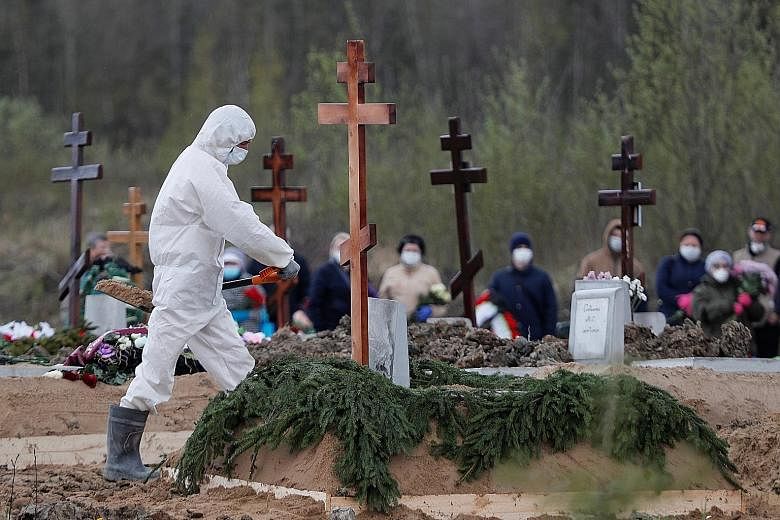Russia has almost 250,000 confirmed coronavirus infection cases, the second-highest tally in the world after the United States.
However, its total mortality figure of just over 2,300 remains very low compared with other major European nations, and is a mere fraction of America's death toll.
But Russia's rates of infection are ominous, with an average of 10,000 new cases registered every day.
The pandemic could not have come at a worse time for the nation, as it is reeling from the combined effects of low oil prices and the global economic downturn.
The Russian government was slow to respond to the health crisis; until early March, the authorities in Moscow had still appeared confident that their country would not be severely affected.
It also had a political interest in downplaying the health challenge. A nationwide referendum on constitutional amendments designed to allow President Vladimir Putin to remain in office for many years to come was scheduled for April 22.
Furthermore, Mr Putin was looking forward to welcoming world leaders such as Chinese President Xi Jinping and French President Emmanuel Macron to a lavish military parade in Moscow that was originally planned for last Saturday, to mark the 75th anniversary of the end of World War II in Europe.
Ultimately, both events had to be postponed, and despite Mr Putin's evident reluctance, mounting coronavirus infection rates eventually forced the Russian leader to order a complete shutdown of economic activity.
Earlier this week, Mr Putin announced the end of what he had gingerly called the period of "non-working days", and ordinary Russians are beginning to emerge from their homes and return to work.
But Moscow, the epicentre of the outbreak in Russia and the city which accounts for more than half of all Russian coronavirus cases, will remain under lockdown until the end of the month.
And the damage the pandemic has inflicted on Russia is certain to be longer-lasting.
Predictably, its medical services - underfunded and forced to cope with an ageing and impoverished population - have received a fair amount of criticism.
Russia has performed relatively well in terms of the number of coronavirus tests it conducts in the population at large; by that single indicator, it is doing better than many wealthier European nations.
But its hospital facilities are proving inadequate, as well as suffering from poor safety records: On Tuesday, Russian firemen battled to put out a fire at an intensive care unit in St Petersburg, the country's second-biggest city. Five coronavirus patients died in the fire.
Furthermore, in a country with a long tradition of "doctoring" statistics, few ordinary Russians believe Mr Putin's reassurances that the pandemic is "under control".
Although statistics for the past month will not be available until next month, preliminary figures point to a 50 per cent to 70 per cent increase in the number of deaths recorded in Russia's capital city, in comparison with averages over the past five years.
It is reasonable to assume that at least some of these deaths may be due to unrecorded cases of coronavirus-related complications.
And the economic ravages will be even more severe as the pandemic coincides with a serious downturn in the country's finances because of the collapse in the price of oil, which accounts for around 40 per cent of Russia's budget revenues.
The International Monetary Fund expects Russia's gross domestic product to shrink by 5.5 per cent this year, and this could well prove to be an optimistic assessment.
Meanwhile, unemployment could peak at eight million, admits Mr Alexei Kudrin, Russia's chief auditor; that would be a fourfold increase from current levels.
Mr Putin claims to be "working every day to take measures to minimise the negative impact" of the pandemic; state-controlled media show him conducting frequent videoconferences with government officials throughout the country.
Still, Mr Putin's popularity ratings are dropping to their lowest level since he came to power two decades ago. In one survey, only a quarter of the respondents claimed to have faith in his ability to solve the crisis.
With adequate hard currency reserves, Russia has the resources to get through the pandemic. Mr Kudrin is on record as urging Mr Putin to spend up to half of the reserves on alleviating economic troubles.
Still, Mr Putin is in the unenviable position of having to grapple with challenges over which he has no control, ones which often defy comprehensive solutions.

